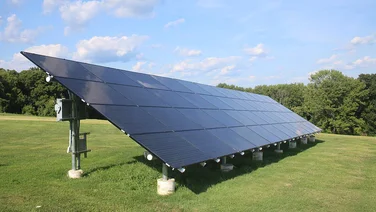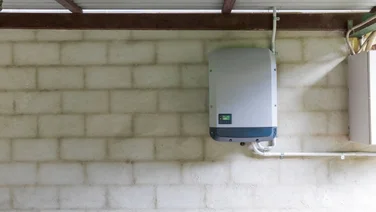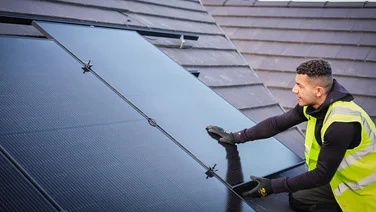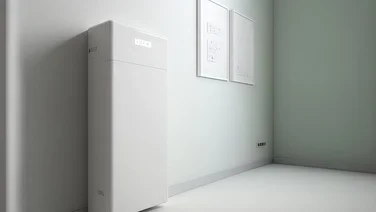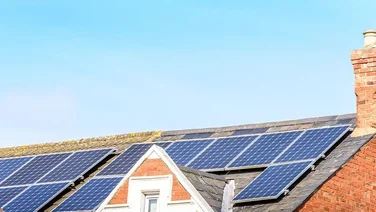We receive a small fee from trusted installers when you request a quote through our site. This helps us keep our content independent, well-researched and up to date – Learn more
- Does a storage battery work without solar panels?
- What are the benefits of a lone storage battery?
- Are there any downsides to using a storage battery without solar panels?
- How much can you save by charging your battery on off-peak rates?
- When will you break even on your solar battery?
- Can you add solar panels to your battery later on?
- Can you charge an electric car with a lone storage battery?
- Summary
- Around 10,000 UK homes have a storage battery
- Storage batteries help reduce your reliance on the grid
- The average price of a storage battery is £4,500
According to the latest official statistics, 10,000 households in the UK now use home battery storage, most of which are used in partnership with panels.
Not every home is suitable for solar panels, though. If your home falls into this category, don’t worry: you can still have battery storage without solar panels. You’ll also get some of the benefits of solar panels (i.e., cheaper electricity bills, increased home value, and lower reliance on the national grid) by installing them. When considering battery storage, it’s important to look at the best solar batteries available.
Here, we’ll help explain how that’s possible, look at the benefits and disadvantages of having a battery without solar panels, and outline how to add a solar array later.
If you’d like to know what solar-plus-storage could cost you, fill in this short form and our expert installers will be in touch with quotes for you to compare.
Which solar products are you interested in?
Get started
Does a storage battery work without solar panels?
Yes, a storage battery can absolutely work without solar panels, which means you can still enjoy all the benefits of solar power.
Additionally, a storage battery can store electricity from the grid, which is a great way to save money if you’re on a time-of-use tariff.
Using a time-of-use tariff to charge your battery means charging it when demand for electricity—and therefore prices—is low (such as in the early hours).
You can draw on this electricity during peak demand or possibly even in power outages. However, you’ll still be using power from the grid, so even if you avoid peak times, you won’t be able to escape the cost of electricity.
We recommend combining battery storage with solar panels for this very reason. Getting solar panels means you can charge your battery for free whenever the sun is up.
You can then rely on your battery when your solar panels can’t generate enough electricity, such as on seriously cloudy days or at night.
The downside is the upfront cost of getting both—on average, battery storage will cost £ 4,500, and a 3.5 kilowatt (kW) solar panel system will cost between £7,000 and £10,000.
A storage battery’s typical lifespan is also 10–15 years. With solar panels lasting 25 years or more, you’ll need to purchase a second battery, which brings the total cost to around £16,000.
While you can charge your storage battery using grid electricity, it’s best to do so when electricity prices are lower. This is typically at night when demand for electricity falls and the grid is under less strain to provide power.
Some people are on time-of-use tariffs, which charge them less if they use electricity when grid demand is lower.
If you’re wondering what size battery you need, an average three-bedroom home in the UK will need an 8 kWh storage battery. One or two-bedroom properties will be fine with a 2–5 kWh battery, and a four or five-bedroom home should consider anywhere between 9 and 13 kWh of battery capacity.
Which solar products are you interested in?
Get startedWill batteries work if the grid goes down?
Not all storage batteries will continue to power your home if the grid goes down, as this poses a risk to the engineers who are fixing it. Basically, there’s a chance electricity generated by your battery will feed back into the grid, which could spell disaster for engineers working on reconnecting the grid.
Some battery models have features designed to prevent this, and they’ll continue to power your home immediately after a power cut.
See what batteries will power your home if the grid goes down with our guide to the best storage batteries.
Read more: Are Solar Panels Worth It?
What are the benefits of a lone storage battery?
There are big benefits to having a storage battery without solar panels. There are even some benefits that you wouldn’t get if you just relied on electricity from the grid.
Having a storage battery without solar panels has advantages compared to just relying on electricity from the grid. Here are the main ones:
- You can avoid the higher costs of electricity during peak times — by charging your storage battery when demand is lower, you can use this electricity in the evening and avoid paying peak demand prices
- Reduces strain on the grid — using stored electricity during peak demand not only saves you money, but also puts less pressure on the grid, which means fewer power outages for everyone
- Cuts down emissions — for many rural homes, a power cut means turning to a fuel-guzzling generator for electricity. Some storage batteries can let you power your home without one – and if a storm is expected to knock out the grid, you can pre-emptively charge your storage battery, so you’re prepared
- Increases energy independence — not all homes can have solar panels, but you can still get a storage battery to give you more control over the energy you use
What are the benefits of having a storage battery and solar panels?
- Even less reliance on the grid — combining solar panels with a storage battery means you can charge the battery during the day using free energy generated by the sun. You may even be able to go off-grid if you have a large enough battery
- You’ll shrink your carbon emissions—a 4.2-kilowatt solar array can save just over a metric ton, roughly 1,118 tonnes of carbon dioxide greenhouse gas emissions per year. Based on an average of 7 tonnes a year, that works out to be roughly a quarter of the average person’s emissions.
- You can sell excess energy via the Smart Export Guarantee (SEG)—energy generated by your solar panels that doesn’t go to charging your battery or powering your home can be sold back to the grid, too.

Are there any downsides to using a storage battery without solar panels?
- You’re still reliant on the grid because you’ll be charging your battery with electricity from the grid, and you’re at the mercy of electricity prices, even during low demand. The average three-bedroom household pays £773 per year for electricity (as of April 2024)
- A battery will cost you around £4,500, but you’ll still be paying for grid electricity
- You’re better off getting solar panels on their own instead — it’s £7,000 on average for a 3.5 kW solar panel system that will typically last at least 25 years, which is more than enough for a three-bedroom home – and you’ll break even in 13 years, on average
- You can increase your property’s value — our National Home Energy Survey found that 69% of Brits would buy a property that had solar panels installed, the battery is an extra bonus.
- You only get 0% VAT on a storage battery if you purchase it alongside solar panels
How much can you save by charging your battery on off-peak rates?
If you’re on an Economy 7 tariff, you’ll spend an average of 11.57 pence per kWh charging your battery at night. So, fully charging an 8 kW capacity battery on off-peak rates would cost you £0.93 versus £1.78 if charged using peak-demand electricity (based on the UK average price of electricity at 22.36 pence per kWh).
Charging your battery this way each night will cost you £339.68 annually instead of £650.15 if you charge when demand is high.
When will you break even on your solar battery?
If you use off-peak electricity to charge your solar battery, you will break even after around 9 years. Based on the average cost of a storage battery at £4,500, assuming you’re paying 13p per kWh for low-demand electricity on an Economy 7 tariff.
It’ll take 24 years to break even on solar-plus-storage because you’ll need to purchase two solar batteries within the lifespan of a solar panel system.
Can you add solar panels to your battery later on?
Yes, you can add solar panels to an existing battery system. It isn’t even that difficult — it’s just a matter of hooking up your new solar panels to the battery.
Functionally, it’s the same process as adding a battery to a solar panel system, but the other way around.
We recommend using a professional to install and connect your solar panels to your battery system because doing so can damage yourself or the products.
One of the most common questions we get asked is: what are the best solar panels? The answer will depend on your budget, your energy output and your home, among other things. To find the best solar panel for you, visit our dedicated page.
Can you charge an electric car with a lone storage battery?
You can use a storage battery to charge your electric car, but it usually isn’t worth it.
That’s because you’re paying to charge your battery with electricity from the grid, only to then transfer the stored energy to your vehicle — making the battery an unnecessary middleman.
The rare time it might be worth it is if you’re on a tariff that offers cheaper electricity at certain times — at night, for example. You could use cheap electricity to charge your battery, then use it on your electric vehicle.
Summary
- Around 10,000 homes in the UK are already benefiting from battery storage.
- A storage battery is a great way to become more energy-independent, even without a solar panel system to charge it.
- Battery storage alone offers some great benefits, including reducing the cost of electricity from the grid and increasing your personal energy independence.
- Pairing them with solar panels will always be better because you’ll drastically reduce your grid reliance, too. This means less strain on the grid, fewer CO2 emissions, and an important step to a cleaner world for all.
- Installing batteries alone will not get you off the grid, but they offer other benefits that offset this.
- Since the batteries store electricity off-peak, you’ll effectively slash your electricity bills in half by installing them. This should enable you to break even in around 9 years.
- They are very flexible, and you can install them on their own or after you’ve installed solar panels.
- If you have an electric car, you can even charge them from your batteries to further compound the savings you’ll make by installing them.
- If you’re wondering what solar-plus-storage might cost you, just fill in this short form, and our expert installers will contact you with quotes for you to compare.


